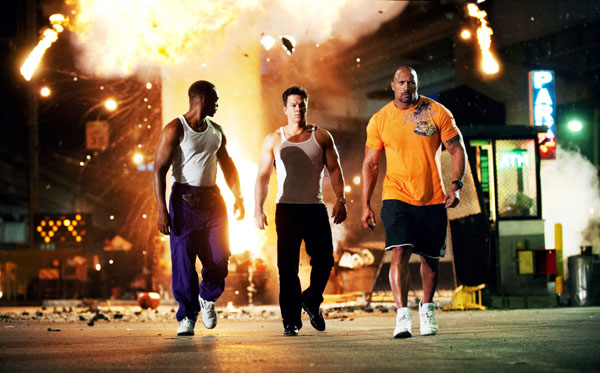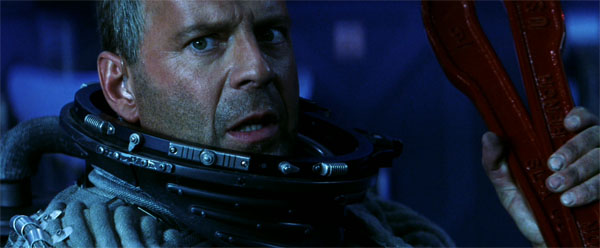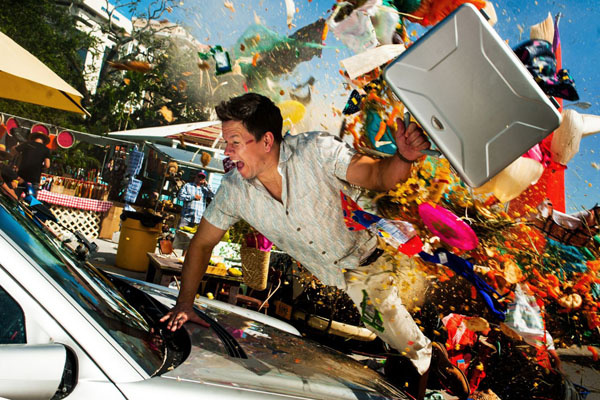Pain & Gain opens on Friday, and the first reviews are out, and we’ll get to them in a moment, but first: a few notes on why anyone would care. Yesterday, the Notebook‘s new “Three Takes” column, in which Calum Marsh, Fernando F. Croce, and Joseph Jon Lanthier each turn in capsule reviews of the same film, was given over to Michael Bay’s Bad Boys II (2003), and therein, Marsh refers to Bay, almost in passing, as a “vulgar auteur.” The formula for vulgar auteurism (and Kurt Walker’s running a terrific tumblr going by that name, by the way)—extract French auteur theory, popularized in the States in the early 1960’s by Andrew Sarris, and coat it in a gooey layer of vulgarity (“characterized by ignorance of or lack of good breeding or taste,” reads my dictionary)—may have originally been concocted elsewhere (Cinema Scope comes to mind), but Danny Kasman’s Notebook at MUBI and the forums adjacent to it are clearly the labs where that formula is being refined.
Jack Lehtonen has even offered a guide in the form of a list at MUBI; it’s a little too all-encompassing, but it’s especially helpful for its collection of links to further reading, each of them appropriately designated as an exclamation mark. In the spirit of Sarris, Lehtonen has erected a pantheon, wherein you’ll find “The Masters” (Tony Scott, most definitely, but also Michael Mann, John McTiernan, plus too many others), “Watch This Space” (McG, etc.), “Curiosities, Craftsmen,” and then, in a category all his own, Michael Bay.
To many, the “vulgar” in Bay will be all too apparent; but the “auteur”? David S. Cohen went looking for it in the summer of 2011 for Variety and turned first to Scott Foundas, who wasn’t yet Variety‘s chief film critic: “He’s an auteur through and through,” Scott told him. “You know within a few seconds of watching his movie that it’s a Michael Bay movie and beyond that there’s no question that he’s influenced the visual language of the contemporary Hollywood blockbuster in a major way.”
Cohen then turns to Variety critic Peter Debruge, who “calls Bay ‘a singular voice’ and notes that of a generation of filmmakers who came out of commercials and music videos, ‘He is the one that has risen to the top of the pack and really continued to pioneer that esthetic on the bigscreen, for better or worse…. Debruge remembers seeing The Rock when he was 18. ‘It was everything I wanted from a movie and then 10% more. And I feel like that’s what he does. He’s the 110% guy.'”
Some cinephiles who prefer their auteurs sans the vulgarity are still coming to terms with the fact that, if they want to complete their Criterion Collection, they’re going to have to shelve Armageddon right alongside their Bergmans and Ozus. Oddly enough, Bay just told Rene Rodriguez of the Miami Herald the other day that he’s sorry about that one: “I will apologize for Armageddon, because we had to do the whole movie in 16 weeks. It was a massive undertaking. That was not fair to the movie. I would redo the entire third act if I could. But the studio literally took the movie away from us. It was terrible. My visual effects supervisor had a nervous breakdown, so I had to be in charge of that. I called James Cameron and asked ‘What do you do when you’re doing all the effects yourself?’ But the movie did fine.”
Profiling Bay for the New York Times, Dave Itzkoff looks at Pain & Gain and finds it “tempting to see a quick and inexpensive response to the excess that his films are known for…. ‘I wanted to do a quirky movie,’ he said. ‘I wanted to do something small, just actors acting. It was almost like film school again for me.’ … Mr. Bay could boast that Pain & Gain was shot in 42 days, that it cost about $26 million (compared with $195 million for the last Transformers) or that it features only one scene of a car blowing up. But he prefers to emphasize its message. ‘It says a lot about life in a weird way,’ he explained. ‘People just don’t appreciate what they have.'”
What the first round of critics, the ones for the trades, have for the moment is Pain & Gain, and we begin with Todd McCarthy in the Hollywood Reporter: “Dim-witted bottom-feeders on steroids and coke run amok seeking the American dream in Pain & Gain, a ham-fisted, thick-skulled comic caper about bodybuilders-turned-criminals which, like its three protagonists, fully lives down to its own potential.” Pain & Gain is “Bay’s idea of a low-budget indie-style film, even though the muscles and ammo on view here are only slightly less imposing than those of his Transformers films. Although ostensibly intending to send up characters and a milieu that are crass and vulgar [!], the film itself shares their affinities to such an extent that this distinction will be lost on audiences whose own lifestyles or aspirations lie in the same general direction.”
“In the hands of another director more invested in character, Pain & Gain might truly sing,” writes Brent Simon for Screen. “But Bay seems to think everything about this tale is naturally funny, from the random beating of a homosexual supporting character to scenes of Daniel [Mark Wahlberg] mentoring neighborhood kids that play like weird outtakes from some nonexistent Drillbit Taylor spinoff. Bay’s characteristic visual fetishes—from low-angle God shots and leering framing—conspire to help overwhelm the material. Human moments of friction and darkly comedic warped thinking aren’t allowed to exist, smothered as they are under a go-go rhythm that can’t sustain itself for the film’s duration. The movies that Pain & Gain would most like to emulate—True Romance, Savages, Wild Things, Domino, and Very Bad Things—all have crisper characterizations and more streamlined narratives.”
“Fargo by way of the Three Stooges,” suggests Scott Foundas in Variety. “Adapted by screenwriters Christopher Markus and Stephen McFeely (Captain America: The First Avenger, the Narnia trilogy) from a series of articles originally published in the Miami New Times, the film tells of… Miami’s Sun Gym, where staff and clientele include a liberal mixture of strippers, ex-cons and small-time scam artists…. While sticking largely to the facts, Bay and the writers are clearly aiming for something bigger: a commentary on American self-entitlement and, to an extent, the very sort of ra-ra, macho posturing Bay has proffered without irony in many previous films…. At his best, particularly in the two Bad Boys movies, Bay can be a master of exuberant chaos, but here the violence mostly lands with a sickening thud, which is fitting, one supposes, but also ultimately numbing.”
Tough Guy Cinema presents BAYMAGEDDON from Alamo Drafthouse on Vimeo.
More to come, ready or not, but in the meantime, the Austin Chronicle‘s Richard Whittaker talks with Greg MacLennan, who’s programmed a four-movie marathon of Bay movies set to unreel at the Alamo Drafthouse on Saturday. “I admit,” writes Whittaker, “I’ve taken the odd pot shot at the old Bayster (I once described Transformers 2 as ‘like getting smashed in the face with a DayGlo hub cap for two and a half hours’). But if Nicolas Cage [in The Rock] flagging down jets with shipping flares after stabbing himself in the heart with an atropine injection doesn’t get you roaring then in the aisles, then check your pulse…. For MacLennan, Bay is ‘the Tony Scott of the ’90s. Tony Scott was just like, “What are all the tricks that I can do? How many film stocks I can use? How many cameras can I have shooting the same thing at the same time, and capture the most dynamic and kinetic and exciting thing?”‘ And, best of all, he’s utterly unapologetic about it. MacLennan says, ‘In the credits to Bad Boys 2, he puts his own name on the screen with a burning cross. He’s just saying, “Fuck you, man, this is what I do.”‘”
Updates, 4/30: First, a few orders of business, beginning with Bay’s retraction of his apology for Armageddon, as reported by the Guardian‘s Ben Child. At Twitch, Hugo Ozman reports that Bay wants to shoot the next Transformers (that’d be #4) in Hong Kong. In the Los Angeles Times, Matthew Fleischer debunks a few urban legends about Bay’s (mis)behavior. And at Slate, David Haglund and Forrest Wickman look into the question, “How True Is Pain & Gain?”
Which brings us back to the movie at hand. The New Yorker‘s Richard Brody: “Its vigor, profusion, and raucous humor don’t advance the art of storytelling but the movie simply outruns, outjumps, and outshines many of the neurotic, etiolated, and retentive varieties that are praised as models of narrative clarity and formal precision…. The comparison of Pain & Gain to Spring Breakers is inevitable—both are stories of movie-inspired naïfs who slip into crime unprepared. But Bay’s movie, to me, feels more like a shifted version of The Player, a sort of inside-Hollywood movie by someone who has been around long enough to see plenty of crashing and burning, of follies and even of crimes, and who, though not withholding judgment, remains curious and amazed. It feels like a young man’s movie made by someone with the calloused experience of an elder—not the work of a reflective filmmaker but of one who takes a sudden and even self-surprising pleasure in seeing what he’s filming. Its superficial heartiness and sincere exuberance have become strangely rare commodities.”
On the other hand, Keith Uhlich in Time Out New York: “You’ve got your jacked-up, Jerry Bruckheimer–sanctioned aesthetic that jettisons all editorial coherence. You have your virulent disgust for non-Caucasians (you again, Ken Jeong?) and women of all shapes and sizes (poor Rebel Wilson is reduced to an African-American-desiring sight gag as Doorbal’s plus-size nurse girlfriend). Should we even mention the crinkle-faced fear of sex outside the hetero norm? (Ew, dildos…for homos!) Or the rancid jingoism—all those ‘Morning in America’ shots of the Stars and Stripes—that the filmmaker half-assedly tries to pass off as searching, soul-of-a-nation burlesque? You’d think the tabloid vulgarity of this true-crime case might make for a choice pairing with Bay’s unabashed, anything-goes crassness—pointed persiflage taken to anabolic extremes. But national lampoon does not become him. Bay can’t ever go deeper than a scornful smirk, and though he occasionally chances on a Van Gogh–worthy visual squiggle, the effect is not unlike an unmonitored child painting with his own feces.”
Salon‘s Andrew O’Hehir: “This is a Michael Bay movie: Hypocrisy and immorality are its text and subtext and footnotes, the coke it snorts off a Croatian hooker’s spray-tanned bum and the exploding green goo on its stolen banknotes. If anything, Bay tries to drive home the point way too forcefully here, the point being that he’s one of the most important, influential and (certainly) representative American film directors of the last 20 years. Did I say he was ‘good,’ or that I ‘liked’ him? I did not, and your insistence on such old-fashioned categories is charming, in a way. Don’t even pretend you don’t want to see this, and don’t come complaining to me if you feel dirty afterward. Isn’t that the whole idea?”
More from Michael J. Anderson (“Pain & Gain produces a metaphor, in its moron-driven, steroid-fueled blunder, for Bay’s deliriously dismissed art”), Louis Black (Austin Chronicle, 2.5/5), Ty Burr (Boston Globe, 1/4), Paul Constant (Stranger), Richard Corliss (Time), David Edelstein (New York), the Film Doctor, Glenn Kenny (MSN Movies, 4/5), Max Kyburz (Film Comment), Drew Lazor (Philadelphia City Paper, C-), Ciara LeVelle (Voice), Ray Pride (Newcity), Nathan Rabin (AV Club, D), Nick Schager (Slant, 2.5/4), A.O. Scott (NYT), Eric D. Snider (Twitch), Dana Stevens (Slate), and Scott Tobias (NPR),
Viewing. The Playlist collects the “Best Commercials & Music Videos Of Michael Bay.”
For news and tips throughout the day every day, follow @KeyframeDaily on Twitter and/or the RSS feed. Get Keyframe Daily in your inbox by signing in at fandor.com/daily.







